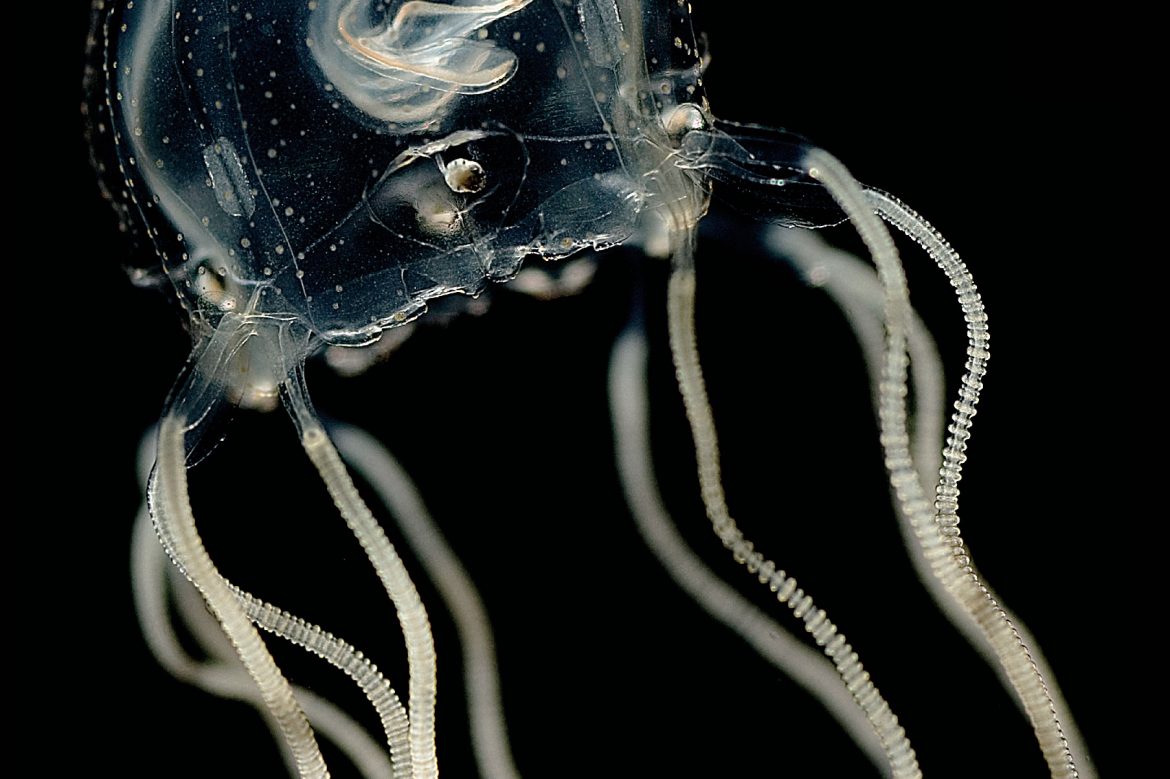
Jellyfish May Be Brainier Than We Thought?
How living things acquire the ability to learn and the biological means by which they do so continue to be topics of particular interest to evolutionary biologists. Can a creature without a brain, as we know it, still have the ability to learn in order to survive? Obsessed with how the jellyfish Tripedalia cystophora can find its way through water without bumping into obstacles, scientists managed to prove that these creatures learn to swim without getting stuck in the water by adapting to their environment with the help of past experiences, and in a very short period of time.
Jellyfish do not have brains, but they have complex neural networks operating their sense of sight. Their bodies have four special organs called rhopalium, each with six “eyes” and about 1,000 nerve cells. These eyes are able to “see” the difference in contrast between light and dark colours to avoid bumping into obstacles while swimming in murky waters. In other words, it compares the hue of an object -such as a mangrove- with that of the surrounding water to determine the distance to it. While it’s easy to distinguish this difference for nearby objects in clear water, it is harder to do so in the murky waters that often make up their habitat. Jan Bielecki and colleagues at Kiel University in Germany, who study the animals’ behaviour, conducted a series of experiments to see if the jellyfish could be taught whether various obstacles in the water were near or far away.
The researchers released 12 Tripedalia cystophora into a tank of water with grey and white vertical lines on the inner surface, and watched their behaviour with a camera for 7 minutes. At first, the jellyfish perceived the grey lines as distant roots and hit the wall when they tried to swim towards them (these jellyfish feed mostly on small crustaceans that live around mangrove roots in the water, so it is normal for them to try to swim towards their roots). But after a short time, they began to perceive these grey lines as nearby tree roots in the murky water, and stopped bumping into them. Within 7 minutes, the wall-bumping rate decreased almost four times and the average distance between the jellyfish and the obstacle doubled.
This experiment suggests that jellyfish, even without brains, have the ability to learn from experience. While scientists say that more experiments are needed before jumping to conclusions, the prospect is exciting.
Bielecki and his team took the experiments one step further, and revealed the real striking aspect of the research. First, they cut the rhopalium organs of Tripedalia cystophora and placed them in a container. Then, they placed a screen for these “eyes” to see, displaying light and dark grey lines on the screen with little difference in hue. Simultaneously, they applied a very weak electric current to the organs to create the illusion that they were bumping into an obstacle. After a while, the organs, which contain a large number of nerve cells, began sending out the same nervous system signals as a jellyfish would under normal conditions when avoiding an obstacle. In other words, the organ “learned” that the obstacles it “saw” were not far away but near, and began taking the necessary precautions to avoid them. This is how the possibility emerged that the rhopalium, thought to be an organ of vision, could in fact be an organ of learning.
This peculiar and interesting experiment, which shows what scientists can do in the pursuit of knowledge, raises many new questions about the learning mechanisms of living things. How do the jellyfish coordinate their four rhopalium organs? When they lose one or more of these organs, do they forget what they have learned?
Bielecki’s experiment also opens the door to various theories about how the ability to learn may have emerged and developed in the course of evolution, and the mechanisms divergent species may be sharing or not.
REFERENCES
- 1. https://www.sciencedaily.com/releases/2023/09/230922110845.htm
- 2. https://www.smithsonianmag.com/smart-news/brainless-jellyfish-are-capable-of-learning-study-suggests-180982959/
- 3. https://www.sciencenews.org/article/brainless-jellyfish-eyes-nerves-learn
